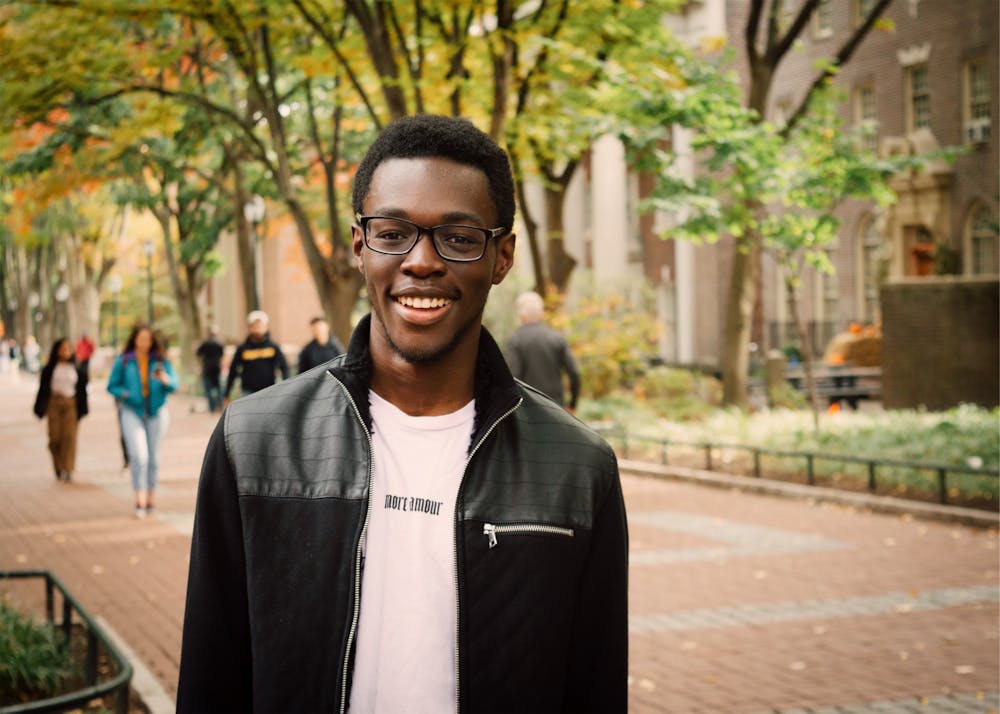Michael Adjei–Poku (C ’20) began his journey at Penn by moving into Kings Court English College House, his seventh choice dorm. He says this ended up being “the best thing that could’ve happened” to him. As a shy and reserved freshman having been placed in a dorm he had no desire to live in, Michael was extremely grateful for the initial connection he made with his PHINS (Peers Helping Incoming New Students) mentor, who also happened to introduce him to his girlfriend of three years.
Flash forward to now—Michael served as the PHINS coordinator for the Class of 2023’s NSO during his role as an NSO intern this past summer. He wanted to provide the same help and support to freshmen struggling with issues such as loneliness, which he faced in his initial months.
“I clearly remember running into several freshmen who seemed to be the exact same as me three years ago. When I came in, I was super shy. I didn't really know what I was doing or where I was going. I wasn't the person to speak out and ask questions. I kind of just sat back,” Michael says.
"I could tell who those freshmen were, so I tried to go out of my way to ask them ‘Are you looking for something?’ or ‘Can I help you in any way?'" he explains. "Then they tell you and you get into a conversation and see them opening up. And hopefully they’re off to a better start at Penn because of it."
Now, three years later, Michael is in a much more secure place. He is majoring in biological basis of behavior (BBB) and criminology and spends much of his time fulfilling his role as the captain of MERT (Medical Emergency Response Team).
Michael got involved with MERT his sophomore year after getting his EMT license back at home in Utah, and he has risen through the ranks. Now he dedicates an average of 15–20 hours to MERT each week. “But I love every minute,” he says with a smile.
His favorite things about MERT?
First, the people: “We're a pretty tight knit group. We spend eight hour shifts together, just chilling, waiting for calls. I'm super close with a lot of people there and I really like them. They make the boring parts of the job less boring, and we’re also there for each other outside of the job.”
As for his academic journey, getting to this point was no easy feat. Michael explains that he has essentially been on a pre–med track his “entire life.” With his dad and brother both being doctors, it was the only profession he could imagine himself doing—that is, until he found his passion in other areas such as criminology, which he took on purely because the subject interested him.
Lastly, and most importantly, he loves “the positive impact that you can have on a certain person's day.”
He explains that most students they encounter are in unfortunate circumstances and might even be having “the worst day of their life.” Michael says that MERT student workers provide a unique perspective through which they can help their fellow peers get through these adverse situations, which Michael calls “the most fulfilling thing.”
“We can say, ‘Hey, we know what you're going through. We know what school is like, and we're here to help you and talk to you as well.’ We try and talk them through whatever is going on so they're not as overwhelmed by all the lights, medics, and officers. You can really tell that it helps people out,” Michael adds.
As for his academic journey, getting to this point was no easy feat. Michael explains that he has essentially been on a pre–med track his “entire life.” With his dad and brother both being doctors, it was the only profession he could imagine himself doing—that is, until he found his passion in other areas such as Criminology, which he took on purely because the subject interested him.
“I would say I’ve had a pretty chaotic journey towards choosing my major. I came in as a bio major, but that's just because bio was my favorite subject in high school. I wasn't dead set on it or anything,” Michael says.
After taking some biology classes and not enjoying them, Michael considered majors in BBB, economics, and psychology before returning to BBB in the end and adding on criminology as well.
“I'm technically still finishing all the pre–med courses, but I'm not planning on going to med school. It's just not appealing to me. My parents still haven't accepted it yet. They still think I'll change my mind,” Michael adds.
Deciding not to go to med school and radically altering his life course remains a significant mental adjustment for Michael, but he has learned to accept the uncertainty.
“I just recently got over the hump of me personally accepting that I no longer want to be a doctor. It was a large decision for me because that's what I always thought I would be and realizing that it wasn't my calling took a while,” Michael says. “But now that I’ve decided, it feels very liberating. I don’t regret it and I don’t think I will.”

